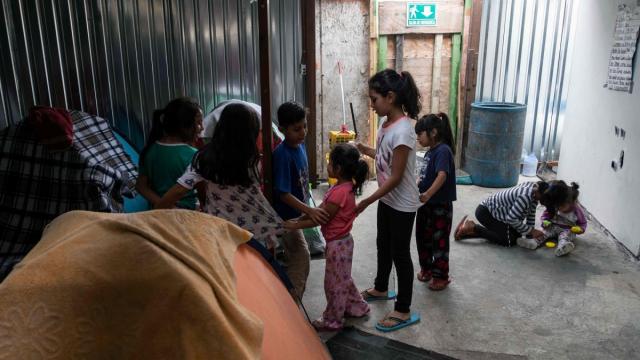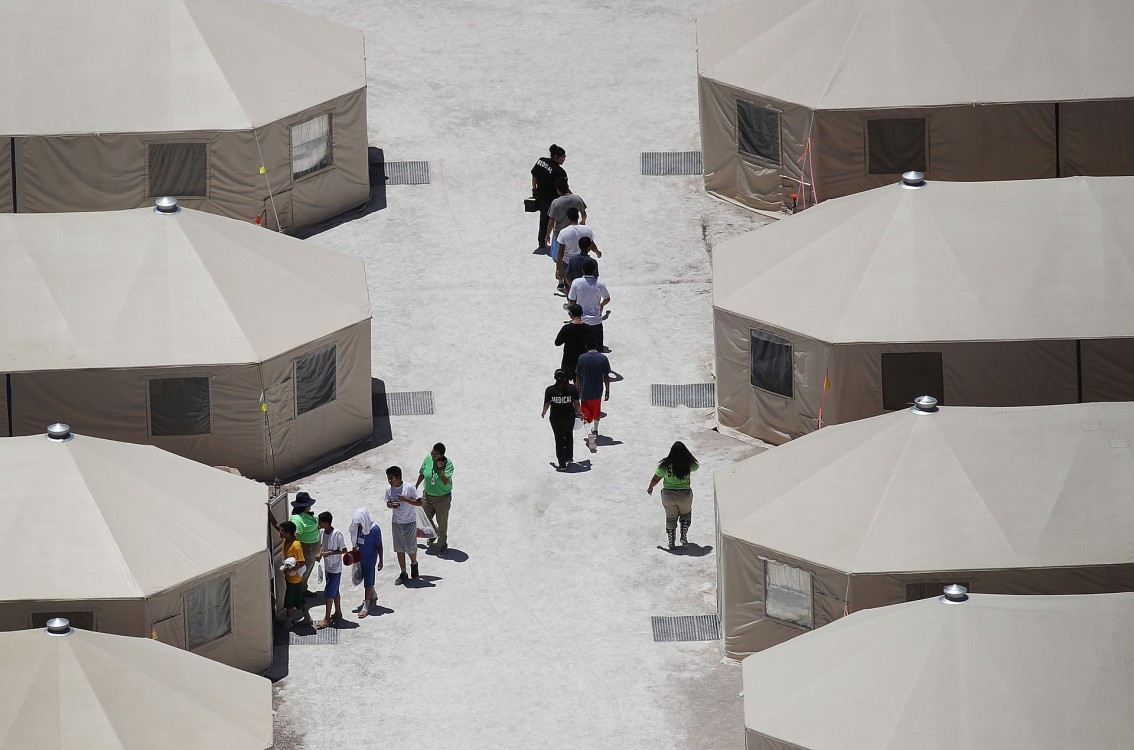
The Trump administration has backtracked on its policy but offered no immediate plan for reuniting families. Photograph: Guillermo Arias/AFP/Getty Images
Donald Trump may have signed an executive order to end the separation of families at the southern border, but his administration is not making any special efforts to immediately reunite the 2,300 children who have already been separated from their parents under his “zero tolerance” policy.
The lack of action has created an additional burden for groups that provide legal and social services to immigrants, flooding non-governmental organisations (NGOs) with cases.
“We would prefer the government to not separate families,” said Megan McKenna, from Kids in Need of Defense (Kind) which offers legal services to unaccompanied children. “But if that has to be the policy then they need to ensure there is a clear protocol that ensures the constant communication between the child and the parent. It’s the only humane thing to do. It’s incredible it’s not happening already.”
Connecting families presents an enormous challenge because once they are detained at the border, children and parents enter two separate systems: for parents, the U.S. Department of Homeland Security and criminal prosecution; meanwhile, children are classified as an “unaccompanied alien child” and transferred to the U.S. Department of Health and Human Services.
“We are dealing with several agencies all trying to coordinate in a disastrous way,” said Zenén Jaimes Pérez from the Texas Civil Rights Project, which provides legal counsel to immigrant families.
Some parents have struggled to find their children, some of whom are being flown to shelters around the country. With no clear process in place, it’s possible some families will never be reunited.
“Permanent separation. It happens,” John Sandweg, who ran the U.S. Immigration and Customs Enforcement (ICE) agency under Obama between 2013 and 2014, told NBC News.
Although both parents and children are allocated A-numbers – “alien” identifiers – and case files, no government body aggregates and tracks them as a family unit. A separated child is treated by the system in exactly the same way as a child who had crossed the border without their parents.
It’s left to the NGOs to put the pieces of the puzzle together.
With each new child Kind deals with, it has to try and figure out their parents’ A-number and search for them on ICE’s online detainee locator system. Some of the organization’s attorneys have tried to guess alien numbers as they can be sequential if family members were processed at the same time.
Without these numbers – and the children rarely have them – they can also search by someone’s name, age and country of origin, but this relies on the details being entered by border patrol accurately.
“We can also check where the child was apprehended and try to guess where the parent might be detained,” said McKenna.
For parents, there is a hotline for information, but there are long wait times and it can be expensive for family members trying to call from abroad.
The Texas Civil Rights Project is taking a different approach. Every day, attorneys go to the courthouse in McAllen, Texas, to speak with adults waiting to be prosecuted for illegal entry.
They have up to 10 minutes to take down their personal information, including the names and ages of the children they were traveling with and their country of origin.
“A lot of people have fled enormous violence,” said Jaimes Pérez. “We had a mother and an 11-year-old son who fled Guatemala after her husband was brutally murdered. They were then separated by CBP [U.S. Customs and Border Protection].”
The group sees between 30 and 40 people each day. “We don’t expect that to abate any time soon given the administration is hellbent on pursuing the zero tolerance policy,” he said.
‘A Wolf in Sheep’s Clothing’
The executive order that purports to end family separation has not been warmly received by NGOs, particularly the part that seeks to modify a settlement agreement that ensured that children could only be detained for 20 days. The order seeks to be able to detain alien families together indefinitely.
“It’s a wolf in sheep’s clothing,” said McKenna. “It would potentially end separation by allowing the government to keep children in jail-like conditions for even longer. This will continue to ensure suffering of kids and their families in a different way.”
Without an end to the zero tolerance policy of criminal prosecution for every immigrant who crosses the border illegally, parents and children will continue to be separated.
“If parents are still being prosecuted as criminals and put in prisons, they will be separated from their children,” said Jaimes Perèz. Family detention centers are already over capacity, despite plans to build more. “What happens in the meantime?”
A bittersweet side effect to the widespread outrage has been a surge in donations and volunteers, particularly to one organization, the Refugee and Immigrant Center for Education and Legal Services (Raices), which has raised nearly $15 million in just a few days through a Facebook fundraising campaign.
The not-for-profit will use these funds to expand its legal and social services for immigrants. Part of this is the launch of the “Families Together” project that aims, through a coalition of like-minded groups, to centralize data management and help organizations locate and reunite family members.
Raices will also use some of the money for its bond fund to get family members released from detention.
Originally published by The Guardian













